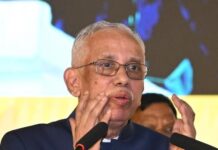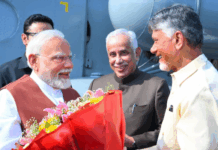New Delhi, August 23, 2024: The Janata Dal (United) and the Telugu Desam Party (TDP) have assured Muslim bodies that they will oppose The Waqf (Amendment) Bill, 2024 which was sent to a joint parliamentary committee earlier this month, the All India Muslim Personal Law Board (AIMPLB) said on Thursday (August 22).
In response to a question by The Wire, at a joint press conference by Muslim bodies, AIMPLB president Khalid Saifullah Rahmani said that meetings had been conducted in recent days with Bihar chief minister Nitish Kumar and Andhra Pradesh chief minister Chandrababu Naidu – the Bharatiya Janata Party (BJP)’s key allies in the National Democratic Alliance (NDA) government.
“We have conducted meetings with several political parties and leaders. We met Chandrababu Naidu and he said we will oppose this bill, we met Nitish Kumar yesterday he also assured us and said they will oppose the bill. We also met Tejashwi Yadav and he said they will oppose the bill. Uddhav Thackeray’s statement has come that we will not allow the government to touch the Waqf. Similarly, a statement has come from the Tamil Nadu chief minister as well. Other secular parties and NDA allies have also assured us that they will oppose the bill,” said Rahmani.
The joint press conference was addressed by Rahmani along with Arshad Madani (president, Jamait Ulama i Hind and vice president AIMPLB), Syed Sadatullah (Ameer, Jamaat e Islami Hind), Asghar Ali Imam Mehdi Salfi (Ameer, Markazi Jamait Ahle Hadith), Mohammad Fazlur Rahim Mujaddidi (general secretary, AIMPLB), and S.Q.R Ilyas (spokesperson, AIMPLB).
The Bill seeks to enhance the efficiency of the administration and management of waqf properties and ensure that the inheritance rights of women are not denied. It crucially omits section 40, which relates to the powers of waqf boards to decide if a property is a waqf property. It also makes the district collector the arbitrator in determining whether a government property is a waqf property.
It seeks to change the composition of the Central Waqf Council and the state waqf boards, and ensure the representation of Muslim women and include non-Muslims. It also provides for the establishment of a separate ‘Board of Auqaf’ for Boharas and Aghakhanis.
According to the reports published in thewire.in the bill faced opposition at the introduction stage in the Lok Sabha, from INDIA alliance partners. While the BJP’s two key allies the JD(U) and the TDP supported the legislation, the latter said that it was in favour of sending it to a JPC.
In response to another question at the press conference, specifically asking about what transpired at the meetings with the BJP’s two key allies, Rahmani did not provide further details but said that this is not a Hindu-Muslim question.
“We have met all political leaders including allies of the BJP. Because this is not a Hindu-Muslim issue. We hope that all parties, including those allied with the BJP will work in the interest of secularism,” said Rahmani.
YSRCP opposes bill in JPC meeting
The press conference came as the 31-member JPC under BJP MP Jagdambika Pal conducted its first meeting on Thursday.
After the meeting ended, YSRCP MP V Vijayasai Reddy said that he had opposed the legislation during the meeting and would be submitting a dissent note. The YSRCP had opposed the bill in the Lok Sabha as well, though it had supported legislation brought by the BJP during the two previous Narendra Modi governments.
In a statement, Reddy said that in line with the party’s president Jaganmohan Reddy’s decision and the party’s official stand, he had opposed the bill at the meeting.
“This bill has many concerns of various stakeholders and is not acceptable in its current form,” he said.
Reddy sought views from all stakeholders in his statement and said that he would put forth concerns in his “dissenting note which will form part of a permanent record in the annals of history.”
Earlier, AAP MP Sanjay Singh, who is also a member of the JPC said that he would also oppose the bill in the meeting.
“We will oppose the bill. There is no question of government interference in religious affairs. Tomorrow you will try to capture lands owned by mandirs and gurdwaras. Article 26 of the Indian Constitution which gives independence to religious groups to administer their own affairs, what will happen to that constitutional right? You are trying to snatch rights given in the constitution. That is why we will oppose it,” he told reporters.
JPC head says open to all stakeholders, Muslim bodies yet to receive invite
Prior to the meeting, Pal said that the JPC would discuss the legislation threadbare.
“Not just the JPC members but other stakeholders like members of the state waqf boards, minority organisations like AIMPLB or Jamait Ulama i Hind or other Shia and Sunni organisations, Agakhani and Bohras, we will call them as well and give them an opportunity as well. The objective of this bill by the government is that property is donated for religious and pious purposes, such property should be beneficial for women, education among others. This is a reform that is being brought. We will discuss all amendments in the new bill in the JPC,” he said.
However, at the press conference, the Muslim bodies said that they are yet to receive an invitation from the JPC.
“The government has kept its doors shut to all forms of discussions with the Muslim community. Who should we talk to? If they take one step we are ready to take ten steps. For now if the JPC calls us then we will go and examine what they say. But for now, the bill in the present form is not acceptable,” said Rahmani.
The Muslim bodies reiterated that the legislation has been brought to destroy Waqf properties and “pave the way for their encroachment.”
“We also appeal to all secular political parties in the MDA and all opposition parties never to allow this bill to be passed by parliament,” the bodies said in a statement.
Ilyas said that the Muslim bodies will continue to meet all political parties in the coming days and explore “all legal political and democratic options.”
“We will explore all legal democratic options if needed, even give a call for a nationwide agitation,” he said.





















